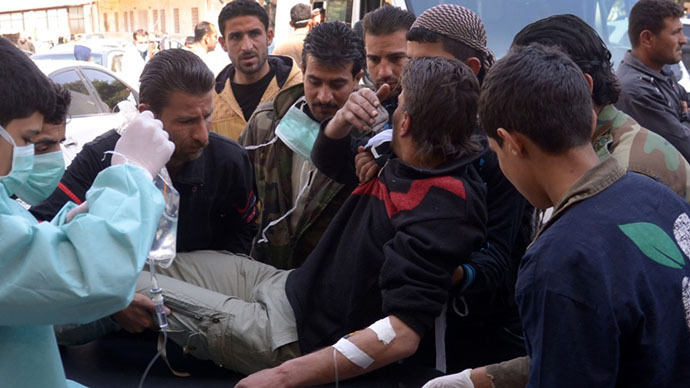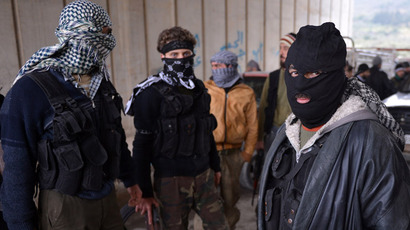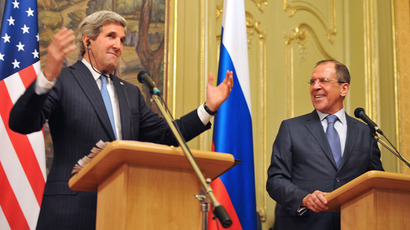UK says no evidence Syrian rebels used chemical weapons despite UN probe

UK PM David Cameron claims there is no evidence the Syrian opposition used chemical weapons. This comes after a UN representative voiced ‘concrete suspicions' that the rebels used nerve gas, even as the world powers were trying to resolve the conflict.
"Our assessment is that chemical weapons use in Syria is very likely to have been initiated by the regime. We have no evidence to date of opposition use,” Cameron said on the eve of his trip to the Russian city of Sochi for talks with President Vladimir Putin. Syria is expected to be at the forefront of the meeting.
The statement by the British Prime Minister comes shortly after a United Nations inquiry into human rights abuses in Syria found evidence that the opposition forces may have used chemical weapons. Investigators spoke with the victims of the ongoing bloody conflict and gathered medical testimonies which indicated that Syrians rebels used sarin nerve agent.
“There are strong, concrete suspicions but not yet incontrovertible proof of the use of sarin gas, from the way the victims were treated,” Carla Del Ponte, a leading member of the UN Independent Commission of Inquiry on Syria, told Swiss TV.
London, along with Paris, have also been pushing to ease EU ban on weapons supplies to Syria. Earlier in May, the UK sent a draft proposal to EU diplomats lift the arms embargo on Syria so that weapons could be sent to the rebels.
Citing the “rapidly deteriorating” situation in the country, the
six-page document calls for the Syrian opposition to be exempt from
the arms embargo and for the phrase “non-lethal aid” to be removed
from the wording of the sanctions currently in place.
But with Moscow and Washington having recently agreed to join efforts in a bid to mediate peace in Syria, London is now hard-pressed to reconsider its support for the Syrian insurgency, according to RT contributor Afshin Rattansi.
“The fact that David Cameron can do this shows he is
completely out of step - after all, it was he who has been trying
to lift the arms embargo for the rebels,” Rattansi said.
“The very rebels that are being sent this so-called non-lethal
force, and equipment, and materiel, they are defecting to al-Nusra,
according to a report in British papers. If Britain has been
exporting, say, night-vision goggles to the Syrian rebels and they
used them in a sarin gas attack, as indicated by Carla Del Ponte’s
UN report, does that mean Britain has been backing chemical weapons
use in the Middle East?”
Moscow warned against lifting the EU embargo as it would be a violation of the international law and expressed hope that ‘reasonable’ European states would prevent such a step.
“Arming non-governmental players violates international
law,” Russia’s Foreign Minister Sergey Lavrov said last week.
“It's not the time to pour oil on the fire of the Syrian
conflict. For all outside players it’s time to push all
parties.”
Russia has been pushing for all sides of the ongoing Syrian conflict – the government and the opposing groups - to come to the negotiating table. Moscow has criticized some international players for providing support and arming the rebel forces.
Kerry: ‘Assad won’t be part of Syria transitional government’
Despite the US now pushing with Russia for an international conference to be called on Syria, US Secretary of State John Kerry said once again that Syrian President Bashar Assad cannot be part of the transitional process.
“The foreign minister will work with us, as they have, to try to bring all the parties to the table so that we can effect a transition government by mutual consent of both sides,” Kerry told reporters during his visit to Rome on Thursday.
“President Assad will not be a component of that transitional government,” he added.
Kerry also revealed that another $100 million in aid will be supplied for the tens of thousands of Syrian refugees who have fled the country since the uprising against Assad began.
The statements came after Kerry’s trip to Moscow where he discussed the Syrian issue with his Russian counterpart Lavrov. The US and Russia have been at odds over the fate of Assad: while Washington insists he must step down, Moscow maintains that only the Syrian people should decide on the matter.
The two powers failed to iron out this difference in approach during the Moscow talks. However, both reiterated their commitment to the Syria peace plan – known as the Geneva Communiqué – agreed by the Action Group for Syria in June 2012 and called for a follow-up meeting on the conference by the end of May.
The Syrian conflict has shown no signs of relenting, despite the efforts of the international community. According to UN estimates, over 70,000 Syrians have been killed since the unrest began over two years ago.














